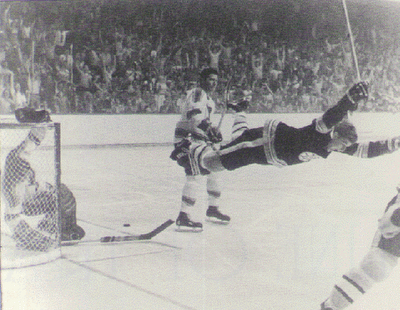
Ecstatic highs and excruciating lows. If you're a Boston sports fan, you know that both come with the territory. Heroics abound, sometimes for the good guys and other times (when God is vacationing) for the bad guys.
If you are a Boston sports fan, you'll have a memory of most of the games or incidents I'm going to write about here. However, just how good is your memory? You remember the home run or the touchdown pass. You remember who threw the strikeout or who scored the goal. But, who else was involved in the play? Who was... THE OTHER GUY?
(Answers Tomorrow)
EASY STUFF
Let's begin with some events that are permanently etched in the memory of every true Boston sports fan. The memories of these should be so vivid, even years after the fact, that they'll actually be imparted in your DNA to the next generation. Your little Bostonian babies will come out of the womb saying...
Bucky Bleeping Dent! Aaron Bleeping Boone!
Might as well mention the two of them together. No two Yankees have caused so much instant misery - not Ruth, not Jackson, not Munson, not Jeter. Bucky Bleeping Dent and Aaron Bleeping Boone.
It's 1978. The Red Sox, after blowing a 14 game lead in the standings and falling behind the Yankees, have rallied over the last two weeks of the season, winning their final 8 games in a row to force a one game playoff, the first in American League history. They lead entering the 7th inning, 2 - 0. In the end, they lose 5 - 4. An amazing season wherein the two best teams in baseball battle it out through 163 games, with the final deciding factor being a one run victory with the other team having the winning runs on base in the 9th.
However painful it may be, let's go back to that 7th inning. Everyone from Woonsocket, Rhode Island to Barton, Vermont, knows that Bucky Bleeping Dent, a banjo hitting infielder, lofts a 3-run homer into the net to put the Yankees ahead to stay in the game. But, who was the other guy? Who gave up Dent's home run?
25 years later. 12th inning, game 7 of the ALCS. Boone hits his walk-off homer and, again, the two teams have fought an entire season with the final margin being one run. What Red Sox pitcher, who could well have ended up as series MVP with a Sox win, instead walks off the field saddened?
Hendu
Enough misery. Let's get to the good stuff.
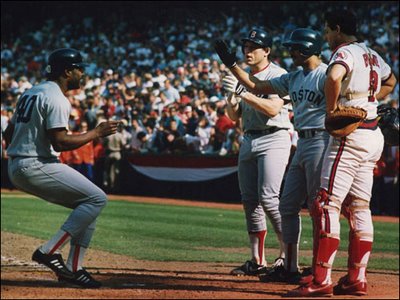
Look closely at the photo above. Who is the catcher? That's right; Aaron Boone's father. What goes around sometimes comes around. However, that's not the answer here, so keep your thinking cap on.
Two outs in the ninth. The Angels are leading the ALCS by a three games to one margin. Dave Henderson has taken two weak swings and the Angels are one strike away from going to the World Series. Then, magic. Hendu swings and puts the ball over the fence. The Red Sox go on to win the game and, eventually, the series.
Who threw the pitch that Henderson walloped?
"If it stays fair..."
Game 6 of the 1975 World Series. Many - myself included - consider it the best World Series game they've ever seen. The Red Sox, trailing three games to two in the series, battle back from a 6 - 3 deficit in the 8th inning and win the game on Carlton Fisk's 12th inning shot that stays barely within the left field foul pole.
Off of which Cincinnati Reds pitcher did Fisk hit his historic home run? Extra credit if you can tell me which Red Sox batter hit the totally shocking three-run homer in the 8th inning to tie the game, without whom there would have been no Fisk heroics later.
Hail Mary
Are you ready for some football?
It's the day after Thanksgiving and the Boston College Eagles travel to Miami to take on the Hurricanes. It turns out to be an amazing battle of two virtually unstoppable offenses. A national TV audience is treated to Miami and BC battling back-and-forth, trading scores all day, until Miami takes a 45 - 41 lead with under a minute left.
Bernie Kosar has been magnificent for the Hurricanes. However, his Boston College counterpart has been equally magnificent and he is about to become certifiably miraculous. On what will be the last play of the game, Doug Flutie takes the snap from center and rolls out to his right. As time expires, he heaves the ball some 60+ yards towards the end zone.
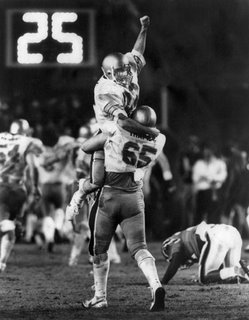
Somehow, some improbable way, a BC receiver gets behind the defense and is able to come up with the ball thrown by Flutie. Touchdown! The Eagles win on the Hail Mary of all Hail Marys, 47 - 45.
Flutie wins the Heisman trophy that year and goes on to a long and distinguished career in professional football. But... who was the miraculous receiver?
Goal!
The picture at the top of this post is permanently etched into the memory of every Boston sports fan of a certain age. It deserves to be. It's one of the best sports photos of all time. Bobby Orr, having scored the game-winning goal in overtime of game four, flies through the air like Superman - which he was, of course. The Bruins win the Stanley Cup!
Ah, but who was the Hall-Of-Fame goalie that Orr scored on?
TRAGEDIES, BOTH REAL AND IMAGINED
There's a great little movie from the 70's called Phantom Of The Paradise. One of the main characters is Beef, a somewhat fey heavy metal vocalist. Beef takes a lot of drugs. The title character has been wreaking havoc backstage, including attacking Beef while he was showering. Beef tells someone about the attack and the person he tells, knowing Beef's proclivity for drug usage, says that Beef probably imagined the whole thing. In reply, Beef says, "I know real real from drug real!"
Similarly, there is real tragedy and sports tragedy. We should all know the difference.
Tony C
Tony Conigliaro was a local boy made good. From Revere, he was the A. L. Home Run Champ in 1965. He was the youngest player in the history of baseball to have hit 100 career home runs and he looked to have a decent shot at being the all-time leader in that category someday. He also had good looks that made a fair number of female Sox fans weak at the knees. In 1967, he was the rightfielder on the first Sox team in more than 15 years to find itself in the thick of a true pennant race.
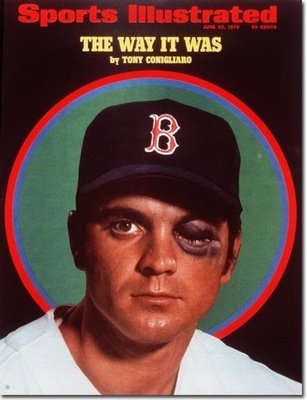 One pitch changed everything. On a hot August night, he was struck square in the eye by a fastball. It crushed his eye socket. It would be 1969 - 21 months later - before Conigliaro stepped into the box to again face major league pitching. That he came back at all from such a horrific injury was heroic enough, but he also had a very good year in 1970, stroking 36 home runs. In 1971, he had to retire after suffering continual bouts of double vision. He came back AGAIN in 1975, making the team in spring training. He only played a handful of games, though, and that was that.
One pitch changed everything. On a hot August night, he was struck square in the eye by a fastball. It crushed his eye socket. It would be 1969 - 21 months later - before Conigliaro stepped into the box to again face major league pitching. That he came back at all from such a horrific injury was heroic enough, but he also had a very good year in 1970, stroking 36 home runs. In 1971, he had to retire after suffering continual bouts of double vision. He came back AGAIN in 1975, making the team in spring training. He only played a handful of games, though, and that was that.More true tragedy awaited him. Having been in Boston to interview for a sportscasting position in 1982, Tony was being driven to the airport by his brother, Billy, when he suffered a massive heart attack. A series of strokes followed. He was confined to a wheelchair for the rest of his life. He died at the age of 45.
Who threw the pitch that changed everything for Tony Conigliaro?
"There's a slow roller up the first base line..."
And then there is the tragedy we ourselves invent and then foster on others unfairly.
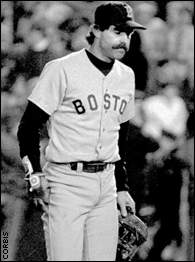 Bill Buckner was a great baseball player. He was a batting champion and had amassed close to 2,500 hits. He had great resolve and courage. His knees were horrible - his ankles may have been even worse - and he hobbled around the bases when he had to run. A lesser man would have retired from baseball already, but Buckner was willing to give up his body for the game he loved.
Bill Buckner was a great baseball player. He was a batting champion and had amassed close to 2,500 hits. He had great resolve and courage. His knees were horrible - his ankles may have been even worse - and he hobbled around the bases when he had to run. A lesser man would have retired from baseball already, but Buckner was willing to give up his body for the game he loved.In 1986, the Red Sox don't make the World Series without Bill Buckner. It's that simple. He had 18 home runs and 102 RBI. And he played a good first base all year. The yahoos and dolts who only remember the one ground ball that went through his legs, and who would blame the Red Sox loss in that series on Buckner, are wholly unjustified. Reasonable baseball fans know this as surely as they know their own names, but still Buckner is vilified by the great idiotic masses. It is a tragedy for Buckner, but only because so many casual observers refuse to see the big picture. These self-blinded fools created their own hell and, not content to suffer alone, condemned Buckner to eternal damnation in it.
(Take this to the bank. Anyone who uses "Buckner" as a pejorative is a dilettante, not a true baseball fan. Ignore him or her with fearless and absolute impunity. They know nothing about the sport.)
Who hit the slow roller that went through Billy Buck's legs?
RECORD BREAKERS
The electric moment when history is made!
(History is made in non-electric moments, also. As a matter of fact, to be precise, history isn't made at all. It just keeps on happening and, later on, we choose what part of it to tell future generations about. However, I digress, rather Calvinistically.)
61
Before Bonds, McGwire, Sosa and second basemen with warning track power from all over the world started bulking up on steroids and other assorted junk, making home runs a much cheaper commodity, there was Roger Maris. In 1961, Roger Maris broke Babe Ruth's single season home run record which had been set way back in 1927. Maris hit 61 home runs, dramatically getting the final one, the tiebreaker, in the last game of the season.
Some of you are saying, "Well, this is sports alright, but what does it have to do with Boston?"
Simple. The final game was against the Red Sox. Maris set the record by belting his home run off of a Red Sox pitcher. Which one?
20
Each team gets 27 outs in a regulation nine-inning baseball game. The difference between a good team and a bad team is often not how many hits they get, but how productive their outs are. The out with the least possibility for any sort of productivity is the strikeout. Even a double play grounder starts out dangerously. A strikeout doesn't start out at all.
Roger Clemens struck out 20 Seattle Mariners in one game. That means that 20 out of a possible 27 outs didn't even leave the catcher's mitt. Stuff like this is always arguable, but I'll say that this was the most dominant one-game pitching performance ever. It certainly is the most dominant one I ever saw.
What unfortunate member of the unfortunate Mariners became Clemens' record-breaking 20th strikeout victim of the night?
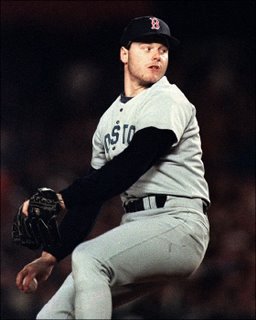 Tomorrow, with the answers.
Tomorrow, with the answers.
11 comments:
Torrez and Wakey..that's as far as I got....for now.
Bernie Carbo....the shot before the shot.
I'll leave the rest of the Sox questions alone...but I have that Clemens game, the first 20 strikeout one against Seattle, on tape, and wow, I revisit it every year. A truly dominant Rocket. And still, 20 years later, I treasure that VHS tape so much! A channel 38, WSBK production, with Ned Martin and Bob Montgomery as our announcers. Oh mercy!!!
A correction Suldog. The Red Sox NEVER had a 14-game lead in '78. On July 19, 1978, the Yankees were 14 back, but they were in FOURTH place at the time. On that day, Milwaukee was in second, 9 back of the Sox. That was the longest lead the Sox had that year. So if anyone EVER says: "The Red Sox blew a 14 game in '78", they are wrong! The Yankees game back from being 14 down. A big difference. (Sorry, I always get off on a rant when that comes up.)
Answers to your questions:
1. Tim Wakefield would have been MVP had the Sox won the 2003 ALCS.
2. Hendu hit his famous HR off Donnie Moore.
3. Pudge's HR in Game 6 was off the immortal Pat Darcy.
4. Gerard Phelan caught Flutie's Hail Mary in 1984.
5.You got me on the goalie who Bobby Orr scored the Stanley Cup off of!!
6.Tony C was beaned in 1967 by Jack Hamilton.
7. Mookie Wilson hit the roller heard-round-the-world.
8. Roger Maris hit number 61 off of Jack Fisher in 1961.
9. Clemens' 20th strikeout on April 29,1986 was Phil Bradley (Spike Owen was number 19).
"The Red Sox blew a 14 game 'lead' in '78", they are wrong! The Yankees 'came' back from being 14 down.
(I made a couple of mistakes on my previous post. Sorry about that. Have to pay better attention next time.)
Good quiz, Suldog. I'll have to do my own Red Sox quiz at my blog soon!
Glen Hall was the goalie that Orr scored against.
Tracey Stallard gave up #61:
Hitting The Grounder through Buckner's Legs was Heywood "Mookie" Wilson;
The Losing Pitcher was Calvin Schiraldi;
Fat Jack Fisher Gave up #60(Orioles).
The St. Louis Blues' goalie that Bobby Orr scored on was Glenn Hall. I know nothing about the other ones, but I had to take advantage of the hockey trivia I learned growing up in Northern Ontario (with a hockeynut Dad who used to party with the team in Boston).
Although he was playing for Colorado (my team) at the time, he'll always belong to Boston - Ray Bourque actually made the coolest save I've ever seen by a non-goalie during the 2001 finals. The puck went right over Roy's shoulder and Bourque whacked it like he was going for a home run. Sent it flying back over Roy's head and pretty much out of the zone. He didn't even break his stick.
oh i miss hockey
I stand corrected about Maris' #61 (thank you Michael). Mookie's real name is actually William Hayward Wilson...
Mr Dent is an Urban Legend:
Mike Torrez gave up that Homer, but the guy who hit the Winner was Reggie Jackson.
Post a Comment